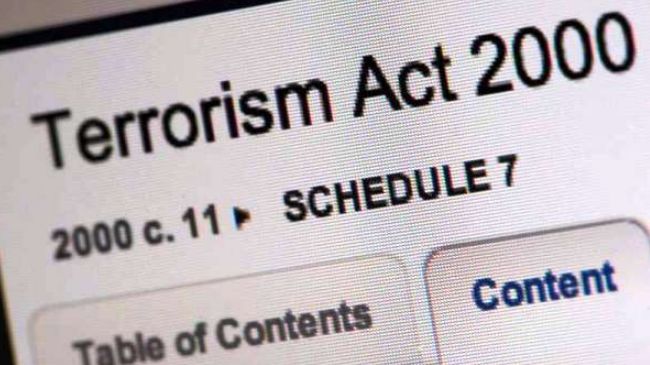‘Terrorism Act’; power UK police abuse

Terrorism Act 2000 was first tabled upon recommendations made by Lord Lloyd of Berwick to provide ‘the first permanent counter-terrorist legislation in the UK’.
Lord Lloyd was the head of an inquiry into the need for permanent terrorist legislation following the IRA ceasefire which was held on behalf of the Conservative government in 1996.
The act was aimed at making provision about terrorism, prosecuting and punishing certain offences, which occurred in Northern Ireland. It also was claimed to be drafted in order to preserve peace and maintain order.
However, it contained draconian measures which were contrary to the claim of securing the public from terrorist attacks.
It was proposed by Lord Lloyd that Prevention of Terrorism (Temporary Provisions) Act be reformed. The act contained emergency provisions that were clinched in 1974 for Northern Ireland.
Terrorism Act 2000 went through multiple changes and updates upon an annual renewal in the House of Commons. Updates were aimed to give authority to the government to impose long-sought restrictions on civil liberties.
The applied changes also widened the definition of terrorism to include domestic terrorism, international terrorism and terrorism linked with Northern Ireland.
The definition of terrorism, meanwhile, expanded as stipulated in a bill in the year 2000.
The bill read: “Formerly defined as “violence for political ends”, it now includes action, used or threatened, for the purpose of advancing any “political, religious or ideological” cause. In 2008 this was extended to include a “racial” cause. Action is defined as including: violence against a person, damage to property, serious risk to the health or safety of the public or a section of the public and behaviour designed seriously to interfere with or seriously to disrupt an electronic system. All subsequent powers for the police and courts flow from this definition”.
The legislation faced widespread opposition at the House of Commons with many MPs expressing misgivings about its possible impact on the public.
They were right because the law would enable the government to stop political protest. Another concern was that if an organization or a group was labeled as terrorist only by some illusions, then any contact with that group would be regarded as an offence or criminal activity.
For example, the act made it possible for UK-based activists campaigning for change to be labeled as terrorists.
“There is a real danger that refugees and others who have fled repressive regimes to the safety of this country will become a legitimate target of the police merely because they support the overthrow of that regime, even if they themselves are opposed to violence”, Liberty said.
Section 44 of the Terrorism Act 2000 was heavily criticized since it was misused by the police to crackdown on peaceful protests.
Liberty said that Section 44 has “been abused to intimidate protesters at peaceful demonstrations which did not present a terrorist threat”.
Like section 44, schedule 7 of the act also left innocent people to feel humiliated and criminalized.
The police were misusing terrorism powers derived from schedule 7 to stop and question activists on their political activities.
Under Schedule 7 of the Terrorism Act 2000 no members of the public had the right to silence. It meant that a refusal to answer questions can lead to a criminal conviction.
Under the hugely intimidating powers, people can be detained for up to nine hours and have their DNA and fingerprints taken.
The best of it all was that no ‘reasonable suspicion’ is needed – the police and border authorities can stop whoever they wish.
Schedule 7 provides wide powers, but does restrict the purpose of the stop to the prevention of terrorism. Paragraph 9 states that;
“the powers…should not be used for any other purpose [other than in connection to terrorism]”
And in the Notes for Guidance on paragraphs 9 and 10;
“an examination must cease and the examinee must be informed that it has ended once it has been ascertained that the person examined does not appear to be or to have been concerned in the commission, preparation or instigation of acts of terrorism,”
Schedule 7 was widely used to harass people who appeared to be Muslim or those coming from migrant communities.
Schedule 7 powers are discriminatory and draconian, they undermine civil rights and criminalize communities and political dissent. They also remain the least transparent of all.
Figures published by the Association of Chief Police Officers (Acpo) highlight the concerns that Schedule 7 is being abused by the police officers.
It means they disproportionately target people from ethnic minority backgrounds under this power.
Police officers misuse the power to stop and question all the people at Britain’s ports and airports without any suspicion whether they are engaged or involved in a terror-related activity.
Officers may “physically detain the person for up to nine hours; search them and their belongings; strip and search them; take their DNA and fingerprints; question them on their social, political and religious views”.
The coalition government, when it came to power in May 2010, vowed to respect civil liberties as one of the core issues needing to go through reforms. It drafted the new ‘freedom bill’ to restrict some police powers which are being abused. But when it came to Schedule 7, yet they are dead silent.







